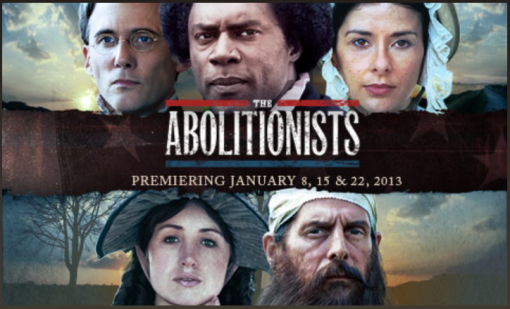Things have been busy around here. Very busy indeed. So, despite having received the discs well in advance, my intention to view each of three episodes of PBS’s American Experience: The Abolitionists prior to their airing remains an intention. I do apologize. But here’s some info: the first part airs tomorrow night (Tuesday, January 8) in the Pittsburgh market, with parts II and III airing on successive Tuesdays. I’ll try to view the 2nd and 3rd parts in advance and hep you to them, but I can’t make any promises. Go here to view more details.
I tend to agree (will wonders never cease?) with the theme of Gary Gallagher’s The Union War that the pendulum has swung a bit too far to slavery as the cause of the war (not from an action standpoint, but from a motivational one, if you get my drift.) There’s too much stridency on the part of the pendulum swingers for my taste, but hey, that’s the way pendulums work. They go from one extreme to the other, right? While there are talking heads involved (usual suspect David Blight is first and foremost, but also a few folks with whom I’m unfamiliar – but “Abolition” titles total only 10 or so volumes of my library so that really doesn’t mean anything), The Abolitionists is a more theatrical presentation, with actors in the lead roles of Frederick Douglass, William Lloyd Garrison, Angelina Grimke, Harriet Beecher Stowe, and John Brown. Most prominent among them, for me at least, is Richard Brooks as Douglass. You may know him better as Assistant DA Paul Robinette on Law and Order or, if you are a hopeless geek, as bounty hunter Jubal Early on Firefly.
Anyway, I will try to be better about filling you in on the next two episodes in advance, but if you want to talk about the show after it airs Tuesday we can do that here or over on the Facebook page.


Excellent point about pendulum swinging. It’s interesting that historical subjects usually have to go through this to reach a ‘balanced’ point.
It reminds me of the Cavalry (and Army) in the Indian Wars. The army and cavalry were at first ignored when the Indian wars were going on (unless something went bad), to being celebrated in John Ford’s films, to later being pretty much compared to Nazis in other films and books, to hopefully now a more ‘balanced’ perspective on their thankless role.
Chris
LikeLike
Harry:
Watched it. Thought it fell into the “pretty good” / “decent” category. Nice production values and acting. The biggest flaw was a missed opportunity (or two or more) in providing better historical context for viewers in the narration. Like when the narrator noted, in passing, the presence of the free black community in Baltimore, without explaining to folks–even if in a sentence or phrase–how such a thing existed. Still, perhaps that’s nit-picking. Overall, I enjoyed it.
LikeLike
Thanks, Terry!
LikeLike